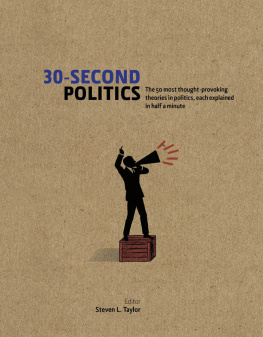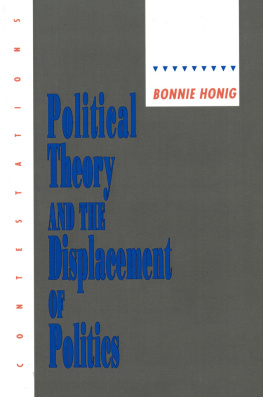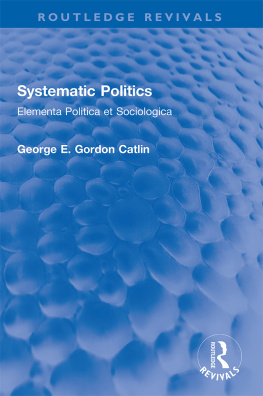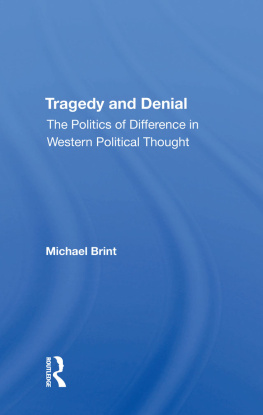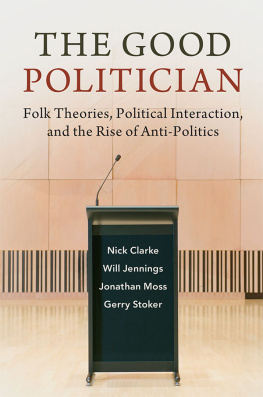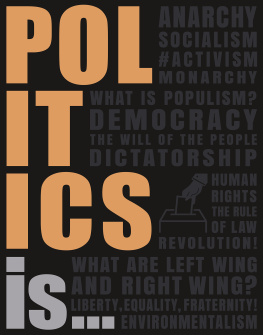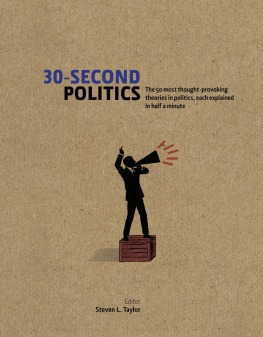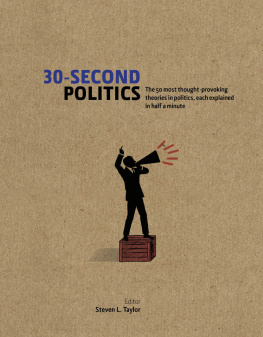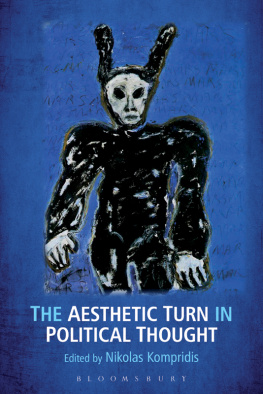
30-SECOND
POLITICS
The 50 most thought-provoking theories in politics, each explained in half a minute
Editor
Steven L. Taylor
Contributors
Michael Bailey
Elizabeth Blum
G. Doug Davis
Christopher N. Lawrence
Feng Sun
Steven L. Taylor
Gregory Weeks

First published in the UK in 2012 by
Icon Books Ltd
Omnibus Business Centre
3941 North Road, London N7 9DP
email:
www.iconbooks.co.uk
2012 by Ivy Press Limited
The editor and contributors have asserted their moral rights.
No part of this book may be reproduced in any form, or by any means, without prior permission in writing from the publisher.
This book was conceived,
designed and produced by
Ivy Press
210 High Street, Lewes
East Sussex, BN7 2NS, UK
www.ivypress.co.uk
Creative Director Peter Bridgewater
Publisher Jason Hook
Editorial Director Caroline Earle
Art Director Michael Whitehead
Designer Ginny Zeal
Concept Design Linda Becker
Illustrator Ivan Hissey
Profiles & Glossaries Text Steve Luck
Senior Editor Stephanie Evans
Project Editor Jamie Pumfrey
Digital Assistant Emily Owen
ISBN: 978-1-848313-27-6
CONTENTS
INTRODUCTION
Steven L. Taylor
Much to the delight of political scientists everywhere, Aristotle once described the study of politics as the master science. Of course, he did not do so for the purpose of boosting the egos of a bunch of academics, rather he was expressing the notion that studying the interactions of human beings within the confines of political life encompassed the study of practically everything. While perhaps a grandiose formulation on the one hand, on the other consider the following set of issues that fall under the general rubric of politics: war and peace, criminal justice, taxation, safety regulations, civil rights and liberties, trade, abortion, marriage and rules governing scientific enquiry (to name but a few). Given the significance of these types of issues, the rules and structures governing their contents and application directly shape our lives. Put another way: ones daily existence would be very different if one was born in North Korea versus in the South in terms both of material conditions as well as in the realm of rights and privileges. In short: politics matters. This book seeks to be an aid in sorting out the complexity of the political world and the language associated with it.
Aristotle provides a good place to start such a discussion, as he created a simple yet useful typology for classifying regime types by looking at the question of who governs: the one, the few or the many. This approach forms the foundation of the opening chapters of this book. The first chapter, Who Governs?, details what government by the one, few or many might look like in basic terms. The second, Rule by the Few, goes on to examine specifically regimes wherein the one or the few govern, or what we would call in modern parlance authoritarian regimes. From there we move to the question of Rule by the Many in other words, democratic regimes. This third chapter details the basics of democratic governance while the fourth looks specifically at key elements of governance, especially of a democratic nature, through the prism of the work of Montesquieu, the French philosopher who heavily influenced the writers of the United States Constitution. Since democracy is the dominant form of government globally at the moment (even if imperfectly executed), more time is devoted to that general topic than any other.

Proportional representationHow can we translate multiple interests in society into acceptable public policies? Democracy tries to do this, even if it does it imperfectly.
The various communist theories are considered next. While it is true that, save for a few exceptions, communism is a dead regime type, the concepts are still relevant to political discourse as the terminology remains with us (not to mention that the current world order was shaped in large part, until only a few decades ago, by these ideas).
Beyond basic regime types and theoretical schools of thought, other elements bear consideration. One is the clear connection between politics and economics, and hence the penultimate chapter, Political Economy, deals with a number of interrelated issues. Another key focus for the study of politics is the question of why states go to war and why they make peace. As such, the final chapter details some key terms and concepts in the realm of international relations.
The book provides a lengthy menu of items to sample, yet it offers only a taste of each. Hopefully such samples will inspire further thought, reading and research.

GlobalizationA key political challenge in the current era is that we are all becoming increasingly interconnected.

THE BASICS: WHO GOVERNS?
THE BASICS: WHO GOVERNS?
GLOSSARY
absolute power Total authority over every aspect of a state or nation and its inhabitants. The term is usually used with reference to the power of an absolute monarch. Absolute monarchs ruled absolutely in part due to the concept of the divine right of kings, which affirmed that the kings right to rule was derived directly from God.
Arab socialism A political ideology that combines elements of socialism with a pan-Arabic agenda, which seeks to unify the various countries of the Arab world. Although Arab socialism follows many of the social and economic policies of European socialism, it differs by retaining a strong cultural and spiritual Arabic identity.
bourgeoisie A term most often associated with Marxism to describe the owners of the means of production, by which is meant the capitalist upper and middle classes.
city-state An independent state comprising a single city with sovereignty over the surrounding territory. The most famous city-states are those of ancient Greece, such as Sparta, Athens and Thebes. Although most city-states initially existed as monarchies, over time they developed alternative political systems including aristocracies, oligarchies and democracies.
constitutional monarchy A system of government in which the monarch, although head of state, performs only ceremonial and official duties. Most monarchies today exist within the framework of a constitutional parliamentary system in which legislation is enacted through a democratically elected parliament.
enlightened absolutism The absolute power of a monarch who ruled with a consideration to Enlightenment philosophy. Such rulers introduced reforms that encouraged freedom of expression, religious tolerance and the right to own property. Patronage of the arts and the founding of educational establishments were also indicative of enlightened absolutism.
Next page
